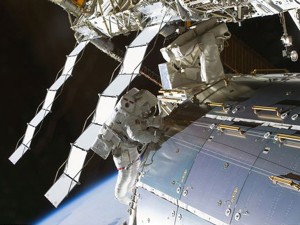
: In this image provided by NASA astronaut Nicole Stott, Expedition 20 flight engineer, participates in the STS-128 mission’s first session of extravehicular activity on the International Space Station Sept. 1, 2009. Two deployed radiators are visible behind Stott. The International Space Station has a radiator leak in its power system. The outpost’s commander calls the situation serious, but not life-threatening. The six-member crew on Thursday May 9, 2013 noticed white flakes of ammonia leaking out of the station. (AP Photo/NASA)
CAPE CANAVERAL, Florida — Astronauts made a rare, hastily planned spacewalk to fix a serious ammonia leak at the International Space Station, and the U.S. space agency said it appeared the repair was a success.
But the following weeks will be the test. Authorities have said the space station’s six-member crew was not in danger from the leak.
“I will tell you that we’re happy. We’re very happy,” Joel Montalbano, NASA’s deputy space station program manager, said Saturday. “We didn’t see any obvious signs of a leak, but it’s going to take some time … for us to look at the system, evaluate the system and make sure we did, indeed, stop the leak.”
Montalbano expects it will take “a good four weeks, five weeks, maybe even a few weeks longer.”
“Obviously, the longer you go, the more confidence you get,” he told reporters.
The space agency never before staged such a fast, impromptu spacewalk for a station crew. Even during the shuttle program, unplanned spacewalks were uncommon.
Christopher Cassidy and Thomas Marshburn installed a new pump after removing the old one suspected of spewing flakes of frozen ammonia coolant two days earlier. They uncovered “no smoking guns” responsible for the leak and kept a sharp lookout for any icy flecks that might appear from the massive frame that holds the solar panels on the left side.
NASA officials remain mystified as to why the leak erupted. Managers wanted to deal with the leak while it was fresh and before Marshburn returns to Earth on Monday.
The ammonia pump was the chief suspect going into Saturday’s spacewalk. Engineers determined there was nothing to lose by installing a new pump, despite the lack of visible damage to the old one. The entire team — weary and stressed by the frantic pace of the past two days — gained more and more confidence as the 5 1/2-hour spacewalk drew to a close with no flecks of ammonia popping up.
“Gloved fingers crossed,” space station commander Chris Hadfield of Canada said in a tweet from inside. “No leaks!” he wrote a half-hour later.
The astronauts had trained for just such an emergency scenario before they rocketed into orbit.
This area on the space station is prone to leaks.
The ammonia coursing through the plumbing is used to cool the space station’s electronic equipment. There are eight of these power channels, and all seven others are operating normally.
Life for the space station residents has been pretty much unaffected since Thursday’s ammonia shower. The loss of an additional power channel, however, could threaten science experiments and backup equipment.
Ammonia already had been seeping ever so slightly, but the flow increased dramatically Thursday.
Montalbano did not know, as of Saturday evening, how much ammonia was lost. Another spacewalk will be needed to replenish the supply.
Marshburn has been on the space station since December and is set to return to Earth late Monday, along with Hadfield and Russian Roman Romanenko. Cassidy is a new arrival, on board for just 1½ months.
By coincidence, the two Americans performed a spacewalk at this troublesome spot before, during a shuttle visit in 2009.
“This type of event is what the years of training were for,” Hadfield said in a tweet Friday. “A happy, busy crew, working hard, loving life in space.”